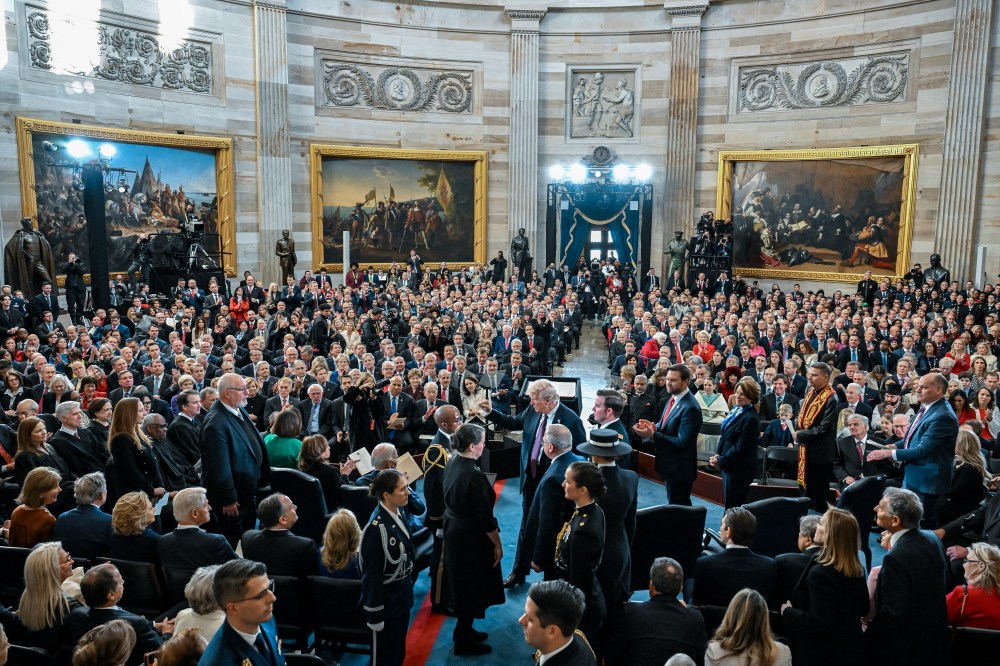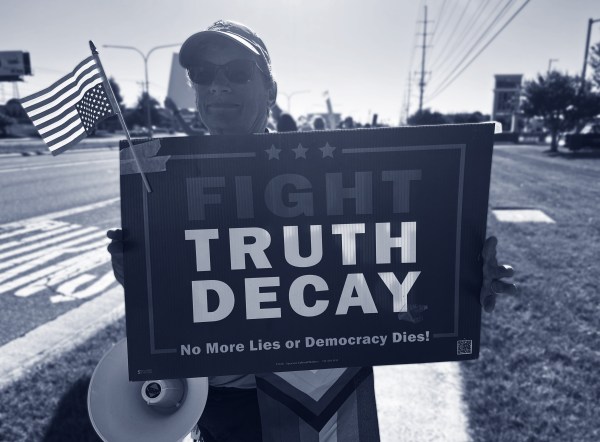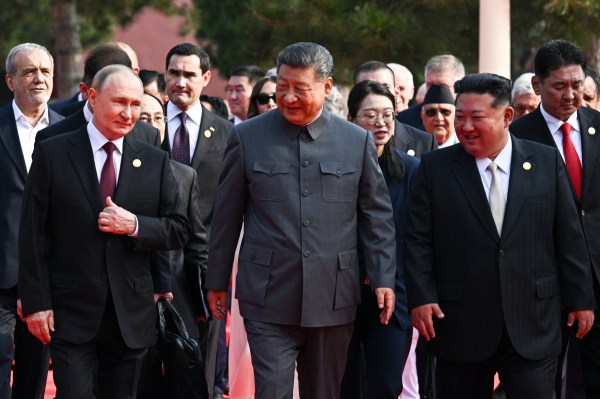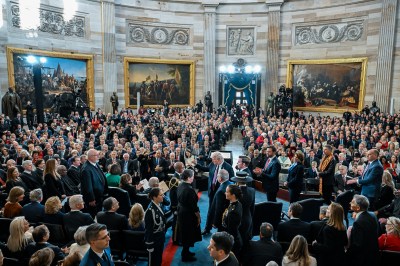Inauguration Day always leaves the losing side feeling queasy. One can swallow only so many sour grapes before the stomach rebels.
But the upset evoked by Donald Trump’s inaugural is different because Trump is different. Even by the standards of presidents beginning their second term, it’s unusual for so many Americans to feel fatigued on Day 1.
“I’m already confused and exhausted on his very first day in office,” Matt Yglesias complained a few hours before Trump was sworn in. “Exhaustion” appears in a lot of post-election commentary, as well as in a notable Associated Press story published last month about weary Americans disengaging from political news. “Everyone knows what is coming and we are just taking some time off,” one Democrat interviewed for the piece said.
Everyone knows what’s coming, yet no one knows what’s coming. That was the thesis of Yglesias’ piece, that apart from immigration no one has any idea what Trump will do with policy. Although we’ve all seen this movie before, somehow it’s impossible to predict the next scene. Power grabs, bullying, demagoguery, corruption, personnel chaos, rule-by-whim, and carnival-barker social media antics are assured, but the particular form they take will be a matter of daily suspense for the next 1,460 days.
If you follow political news closely and fear postliberalism, you’ll spend every one of them simultaneously bone-tired and on high alert. Four years of vertigo: How does your stomach feel?
The other source of unusual inaugural queasiness is the fact that Trump and his movement are grotesque. There’s no other word for it, and there’s no precedent for it in my lifetime, at least among mainstream political coalitions. His operation, especially in its current mature form, is a sick-making carnival of malevolent goblins.
At the center is Trump himself, a lifelong con artist and recently convicted criminal who plainly feels more kinship with foreign strongmen than with the framers of the American experiment. Around him is a motley coterie of tech oligarchs, boorish yes-men, authoritarian ideologues, and preposterous grifters, all jockeying to assert themselves. Beyond that lies a ring of servile Republican mandarins who dislike him and his politics but are too cowardly to do anything but kowtow. And beyond that extends the great mass of MAGA fanatics, ever eager to validate any impulse he might have.
Part mafia, part circus, part cult, part scam: I’ve written more than 400 columns for The Dispatch, most of them on this subject, but I’ll never do justice to how comprehensively grotesque Trump and his movement are. At noon today he smarmily swore an oath of office to defend the Constitution in the same building that his goons attacked four years ago, to his delight, in hopes of installing him in power unlawfully. If you watched it and your stomach didn’t lurch then you’re well and truly boiled.
These four years are going to be worse than even I expected. And that’s not just the usual pessimism talking.
Personal corruption.
Trump’s last weekend before the inauguration seemed designed as a warning to his critics about how unrestrained his term will be. There were so many postliberal pathologies packed into it that if you weren’t queasy already at the thought of him returning to office, you should be now.
First came extreme corruption. On Friday night, days before he took charge of the Treasury and Justice Departments, Donald Trump launched his own cryptocurrency.
Within 36 hours, the value of each $TRUMP token had soared from $7 to $72. (It stands at $45.45 as I write this on Monday.) Eighty percent of those tokens were owned initially by a subsidiary of the Trump Organization, which means the new president’s net worth rose overnight—literally—by tens of billions of dollars.
Jimmy Carter famously placed his peanut farm in a blind trust before becoming president, so sensitive was he to perceptions that his financial interests might influence his policy decisions. Trump’s ethical impulse in his final hours was precisely the opposite: Because he would soon be in a position to influence crypto policy, he wanted his personal stake in crypto to be as vast as possible.
His conflict of interest is so outlandish that analysts struggled for words to describe it. “It is literally cashing in on the presidency—creating a financial instrument so people can transfer money to the president’s family in connection with his office,” one ethics expert told the New York Times. “It is beyond unprecedented.” Crypto enthusiasts aren’t known for their scruples but even they couldn’t hide their horror. One self-described Trump supporter in the industry described the new currency to Politico as “absolutely preposterous. … They’re plumbing new depths of idiocy with the memecoin launch.”
After two days of criticism, the first family responded to the controversy by … launching a Melania Trump crypto token.
I knew his presidency would be corrupt, but I didn’t foresee him devising his very own payment system in TrumpBucks to facilitate bribery from anywhere in the world. A less imaginative kleptocrat would insist on fat envelopes under the table, in secret, but Trump has always had a canny understanding that people are less likely to recoil from corruption when it occurs out in the open.
Foreign policy perversions.
Over the weekend came the next pathology, treating enemies as allies and allies as enemies.
Columnist Anne Applebaum reported Saturday that she had been in Denmark on the day that Trump and his team held high-level talks with the Danish government about Greenland. After their phone call, she said, the vibe among local diplomats had changed suddenly and dramatically; privately, sources described the conversation to her as “rough” and even “threatening.” “Trump himself cannot articulate, either at press conferences or, apparently, over the telephone, why exactly he needs to own Greenland,” Applebaum went on to say, but ownership is evidently what he’s demanding. Offers by Denmark to give the U.S. a greater economic or military presence on the island haven’t satisfied him.
“Rough” and “threatening” is how he treats a NATO member whose soldiers fought and died with U.S. troops in Afghanistan. He reserves congeniality and compromise for more trusted allies, like the Chinese Communist Party.
On Sunday, his last full day as a private citizen, Trump awoke vowing to “SAVE TIKTOK!” Hours later he announced his plan to extend the deadline by 90 days for TikTok’s Chinese parent company to sell the platform to an American entity and declared, cryptically, that he “would like the United States to have a 50% ownership position in a joint venture” with the “current owners.” No one knew what he meant. Does he want a U.S. company or the U.S. government to hold that 50 percent stake? How exactly would a joint venture with a ChiCom propaganda tentacle work? Why does he think he has legal authority to extend the ban deadline by 90 days when he clearly doesn’t?
It will be fun watching Republicans in the House or Senate wrestle with those questions but for now it’s enough to note how completely perverse Trump’s approach to the two countries is. Perhaps it’s a matter of him feeling greater affinity for a totalitarian regime like China’s than a liberal government like Denmark’s and treating them accordingly. Or perhaps it’s a question of pure power, with Trump bullying a small country that can be pushed around and accommodating a large one that can’t—never mind how pathetically weak he must seem to Beijing to be straining so hard to rescue their disinformation platform.
However you slice it, his ongoing effort to transform Americans’ sense of who’s on their side and who isn’t is fully in motion. If you couldn’t understand during his first term why Trump seemed excited to meet Vladimir Putin and Kim Jong Un while appearing to merely tolerate NATO summits, he’s going to give you many more opportunities to try to make sense of it. America doesn’t have “allies” anymore, especially not ones to whom it is bound chiefly by a commitment to liberalism. It has only interests now, and its interests are Trump’s interests, as his embarrassing salvage operation for his new favorite social media platform has made clear.
Civic disasters.
By this time tomorrow, President Trump will likely have pardoned some or all of the January 6 “hostages.”
“Hostages” is his term, of course, not mine. He used it Sunday at his pre-inauguration rally, assuring the crowd that they’ll be “very, very happy” with what he ends up doing. None of that is surprising, but the lack of surprise shouldn’t inure us to how frightening it is to have an unabashed sociopath brandishing the power to free his own henchmen from legal accountability. That practice has a long, dismal history abroad, democracy activist Grant Tudor noted recently for The Bulwark:
For authoritarians, placing oneself and one’s supporters above the law is generally the point. But pardons establish a special pact between the pardoner and the pardoned. In her survey of authoritarians across the twentieth century, the historian Ruth Ben-Ghiat observes how pardons are used to “indebt individuals to the leader and make blackmailers, war criminals, and murderers available for service.” Ben-Ghiat means this in the literal sense: authoritarians engaging in a transactional exchange—of escape in exchange for service.
Right, that’s one downside—especially in an America where, thanks to the Supreme Court, the president is now entitled to abuse the pardon power as corruptly as he likes without fear of criminal consequences. It is a very real possibility that the man overseeing the Justice Department will induce cronies inside and outside the government to commit federal crimes on his behalf with promises to shield them the same way he freed the “hostages.” Freeing the J6ers is itself an act of inducement, frankly.
But clemency for the J6ers will send other civic signals. It will foster the sense that the rightness and wrongness of trying to overthrow America’s constitutional order depends entirely on whether you get away with it. On Election Day Trump got away with trying, ergo his foot soldiers did nothing that they should have to pay for. As with history, it seems, morality is written by the winners.
It will also encourage the perception that federal law is, well, optional, something that will or won’t be enforced depending on how Caesar feels about it. Trump isn’t the only president to issue corrupt pardons—look no further than Joe Biden’s sleazy final act this morning—but doing favors for your relatives is less ominous than doing favors for people willing to commit political violence in your name. Freeing the J6ers is Trump declaring that, by showing him enough loyalty, literally any accused criminal might soon find himself beyond the law’s reach.
Trump as the ultimate arbiter of all federal justice is the logical endpoint of the cult of personality he’s been building for the last decade. There were some lavishly repulsive examples of that on display this weekend too. At his rally on Sunday night, for instance, two speakers who gave the benediction inserted his name in the Lord’s Prayer. His new national security adviser has gone from calling TikTok a “spyware app” last year to a “fantastic app” now, a party-line turnabout that would have made Stalin blush. Elsewhere, Trump crony Rep. Byron Donalds celebrated the return of stability under Trump (stability?!) by declaring, “Daddy’s back.”
From “don’t tread on me” broadsides against the nanny state 10 years ago to pitiful authoritarian bootlicking of a “daddy” president today. “Grotesque” doesn’t do it justice.
The past and the future.
If all of this is what Trump was up to in the days before taking office, imagine what his presidency will be like.
We will soon be overwhelmed by the extent and variety of his corruption, I suspect, and probably by design. Public exhaustion is useful to him; fairly quickly, the only way most of us will be able to cure the chronic nausea will either be by going numb to it or by disengaging from politics entirely. Watching American exceptionalism take a beating this savage, day after day, will be so traumatic as to be unbearable. One has to turn away to cope.
Right now American politics occupies a liminal space in which no one’s sure exactly how much ground liberalism has lost and how much postliberalism has gained. I think that explains why Barack Obama and Joe Biden have behaved so cordially toward Trump recently. It’s not that they don’t believe he’s a fascist, it’s that they’ve fallen back on traditional American civic norms (and basic social manners) in their confusion about how to navigate the moment. Maybe liberalism will reassert itself eventually? Maybe Trump will be less authoritarian and more transactional than he seems? If Americans have decided that reelecting him is “normal,” shouldn’t they treat him normally too—if only to help keep a cold peace between left and right?
America is changing but there’s no “you are here” map. The next four years will provide one.
I dislike nostalgia. Those who celebrate the past and denigrate the present are usually selling something dubious and callous. But it is very hard to believe that in 25 years America won’t be meaner, more ruthless, more ignorant, more civically corrupt, and generally more diminished than it is now. Trump is as much a symptom of that trajectory as a cause—his cronies in Silicon Valley may be more to blame than he is—but it’s impossible that a politics as grotesque as his will lead us to a better place. If I turn out to be wrong in my pessimism, it’s only because the cultural reaction to what he’s about to do will have been more virtuous than I anticipated.
Lately I’ve thought of my friends who have children, specifically whether they realize yet that those children will grow up in a different country from the one they did. Times always change, of course, but liberalism was a tie that bound my generation to the ones before and after mine. For the youngest Americans, coming of age in an America that’s normalized Trumpism, that tie will fray. My friends can and will do their best to raise their children right, I’m sure, but it’s the rare parent who succeeds in planting a civic commitment so deep that it can’t be uprooted by a rotten culture.
When this is over, the only thing Never Trumpers will have been wrong about is that we weren’t alarmed enough. Let no one forget that they were warned.







Please note that we at The Dispatch hold ourselves, our work, and our commenters to a higher standard than other places on the internet. We welcome comments that foster genuine debate or discussion—including comments critical of us or our work—but responses that include ad hominem attacks on fellow Dispatch members or are intended to stoke fear and anger may be moderated.
With your membership, you only have the ability to comment on The Morning Dispatch articles. Consider upgrading to join the conversation everywhere.